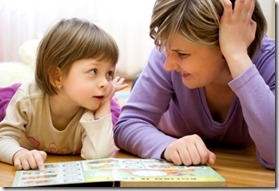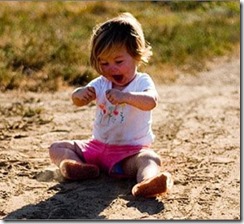The Ultimate Parenting Question: How do you Find the Right Balance Between Protecting Kids & Letting Them Explore?
Every parent has a different parenting style, and each one of us knows a cautionary tale about a parent going to the extreme – being too overbearing or too passive can have equally negative effects on your child’s self-esteem and equilibrium later in life. With these issues, no one has the perfect answer for you and your kids – there’s no textbook to read, no teacher to mark you right or wrong, and what works for someone else may not necessarily be right for you. Online, you can find advice to suit every approach, from parenting tips on getting kids outside, to advice on avoiding the real dangers out there – so how do you translate the sea of parenting advice out there into something that works for you?
Research Parenting Styles
This is all about getting the right balance for you and your child, passing careful judgement on what you read and how it applies to your reality, and avoiding going too close to either extreme. A recent Times of India article points out the dangers of one-dimensional parenting styles and the long term impact they have on kids. For example, pushing our children to succeed is often rightly perceived as a positive thing; but set your expectations too high, and your child could end up feeling as though they have failed as an adult. Likewise, overprotected children can struggle to make independent decisions as an adult, and find it difficult to deal with real life once they’ve grown up and the cotton wool has been removed.
Trusting Parental Instinct
But how do we know when to step in and protect our children from danger or distress, and when to stand back and let them learn from their own mistakes, fight their own battles, and experience failure for themselves? Well, the truth is, we don’t. No one can predict how a situation will pan out 100% of the time. That’s why being able to tell the difference between a justified instinct and an irrational paranoia is such an important parenting skill to have. We must use our own knowledge of the world to make a judgement, and use our instincts to determine how best to parent our children in any given situation.
Building a Trusting Parent-Child Relationship
New technologies such as personal tracking devices make the question of how far we should go to keep an eye on our offspring more relevant today than ever. Social media profiles make it more and more tempting to check up on what the kids are up to. But where does one draw the line between virtual stalking and remote protection? There’s numerous benefits to be gained by just asking our children where they are going and what they are doing and trusting their answer, but how do you know they’ll be safe if you don’t know for sure what’s going on?
What modern parents need is a respectful, truthful, and trusting relationship with their children – and this must fostered from early childhood. One way to build this, as well as help develop a child’s logic and understanding of the world, is to let them play and explore for themselves. It can be a daunting idea, but it’s easy to let them run wild whilst ensuring their safety (and your peace of mind!) if you know a few local play spots that provide a protected environment. And it can make a huge difference to the way your kids feel. You only have to look at the recent Kids Today project to see exactly what it’s like to be a child in a modern environment: head cameras on real kids show them enjoying exploration and play. Luckily, you can find tips on safe play environments even in the city, and you’ll soon see what it means to a child to be able to feel safe while they discover the world for themselves.
child’s logic and understanding of the world, is to let them play and explore for themselves. It can be a daunting idea, but it’s easy to let them run wild whilst ensuring their safety (and your peace of mind!) if you know a few local play spots that provide a protected environment. And it can make a huge difference to the way your kids feel. You only have to look at the recent Kids Today project to see exactly what it’s like to be a child in a modern environment: head cameras on real kids show them enjoying exploration and play. Luckily, you can find tips on safe play environments even in the city, and you’ll soon see what it means to a child to be able to feel safe while they discover the world for themselves.
Letting Your Child Get Messy
Equally, it’s important to a child’s development to let them play and have the freedom to get dirty as they try new things out. Although your input and support as a parent is undeniably essential at times, letting a child play and make a mess without interference is a confidence building exercise on both sides of the relationship. For the child, a bit of independence and freedom helps to boost their self-belief, and for us, finding that a complete mess results in a happy child and a quick clean up reminds us that a bit of muck isn’t the end of the world, and certainly has its benefits. Research suggests that eating the odd bit of dirt is actually good for a child’s immune system, and modern cleaning products make sorting out almost any mess relatively easy, so there’s really no need to worry about a bit of mud anymore.
essential at times, letting a child play and make a mess without interference is a confidence building exercise on both sides of the relationship. For the child, a bit of independence and freedom helps to boost their self-belief, and for us, finding that a complete mess results in a happy child and a quick clean up reminds us that a bit of muck isn’t the end of the world, and certainly has its benefits. Research suggests that eating the odd bit of dirt is actually good for a child’s immune system, and modern cleaning products make sorting out almost any mess relatively easy, so there’s really no need to worry about a bit of mud anymore.
As parents, we all know that there are dangers – like stranger-danger, or busy traffic — things in the world that we really do need to be worried about and should protect children from. But it’s not impossible to balance this awareness, and taking all the necessary precautions, with a realistic perspective. It’s important not to end up controlled by endless “What if?”s. We learn, as parents, by putting these fears into a real world context, and by talking to others with the same concerns and perhaps helpful experiences. So why not share your thoughts? What things in your child’s life do you worry about, and how do you deal with them?
The above post is a guest article from Surf Excel Team.
Linking this to July 2014 Ultimate Blogging Challenge and NaBloPoMo
I think, letting the children be themselves, at least once in a while, is important for their growth and self-esteem. Why some parents are upset at every small mistake a child makes, is beyond me.
Destination Infinity
I think its a very sensitive matter. Raising a child has no formula i think but letting the child explore and be themselves is something we all must encourage. Lovely article. Thanks!!
Great article with lots of informative advice and tips. My children are 18 and 20 now so practically grown but I still need to support them and monitor them while letting them make mistakes and grow. It is a delicate balance and even when they’re out on their own, I will still worry about them. Being a mom changes you forever.
Wonderfully written. Yes, there is no rule book which says what is right and what is wrong, one can only have a vague idea or a general idea on what is to be followed primarily because every child is unique. We would need the parents to be mentors and friends rather than strict rule enforcing people. The balance is the key. 🙂
Letting the child be themselves is one of the best thing sometimes. My parents haven’t pampered me all my life! I had been left on my own many times. I have done mistakes and I have learnt from it! That is something very important I think 🙂
This is a wonderful post and totally in sync with my line of thinking!! I totally agree with a respectful, trusting relationship with my kids!
Having a secure base where a child can return to after exploring is the best thing one can do. As long as that is there, children will be more willing to explore and grow. After all, parents are not going to be around to protect their children all the time!
wonderfully written Shilpa..
A secure home, open communications are the key is what I feel.
The ultimate parenting and what is the right balance are all good only for reading purpose, me think. You may not like what I am going to say. In my home, what comes out of my mouth is the law for my son and daughter.
Shilpa, it’s a brilliant piece on children. I agree with the last part and may I add, children must be friends with nature as well. I mean, I am not a parent but would love my kids to be one with their surroundings and not just computers. I feel, as a parent, would like to know their friends and so they will have a play time together at home.
Sometimes back, read an amazing interview of Dr Shefali Tsabari on conscious parents where she mentioned how wrong many have gone. She said, ‘Parenting isn’t about raising a child, it’s about raising a parent.’
Do lemme kno.
http://vishal-newkidontheblock.blogspot.com/2014/07/an-orkut-love-story-chapter-30.html
each child like the post says is different and have to be treated differently at different stages of life. as far as i am concerned, there can be no parenting manual. We can read as many books and sites as we want and apply the thoughts, the same thought or rule will work differently for different children. finally i think common sense and best interests of the child prevails. But, I believe unconditional love and touch communication like a pat, hug are golden rules for parenting and will help any child to blossom confidently.
Very thorough and balanced write-up.
With children today being exposed to so many situations that were almost unheard of before, the subject of parenting has assumed much greater importance. So many choices have to be made: what, how and when to communicate, when to protect and when to let the kid explore, etc., etc.. Unfortunately, there is no formula that fits all.
It’s very tricky.In my opinion,there can’t be one formula on this subject..Each child has a different level of curiosity and intellect ..Each parent has different priorities and sense of understanding on such issues .
Best is,let each parent decide on case to case basis to get maximum coverage of benefits
It’s essential that a child should learn and explore his surroundings on his own. Being controlled all the time could have negative effects to a child’s mental equalbruim. I loved the useful tips shared here.